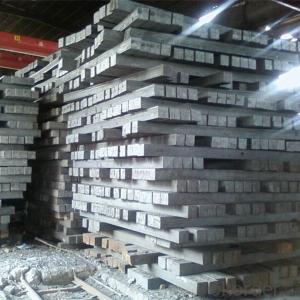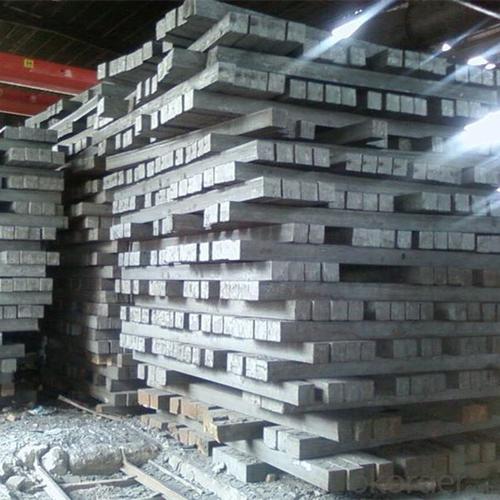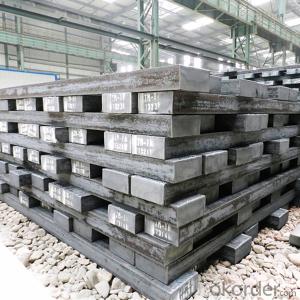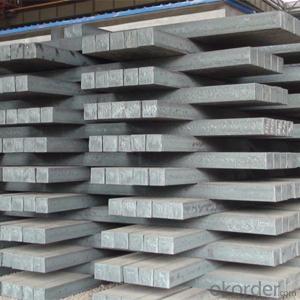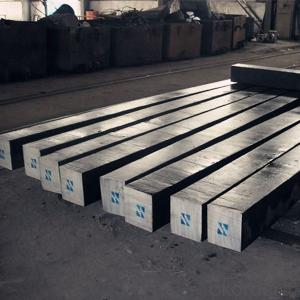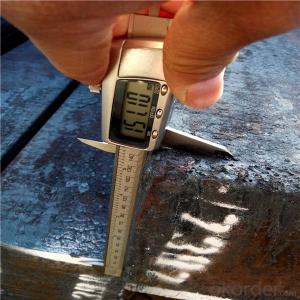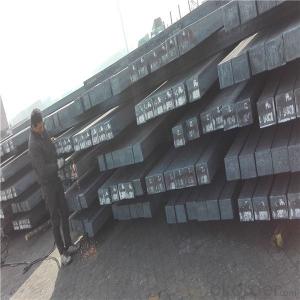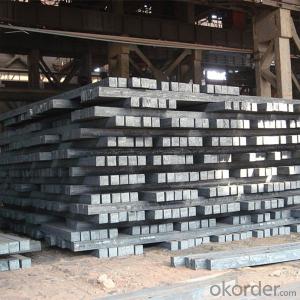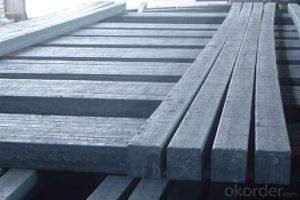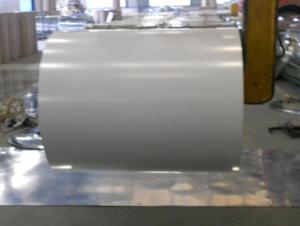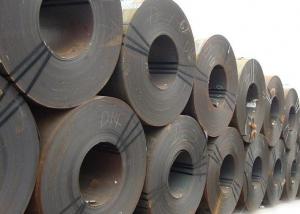Prime Steel Billets From China Tangshan Manufacutrer
- Loading Port:
- China main port
- Payment Terms:
- TT OR LC
- Min Order Qty:
- 1000 m.t.
- Supply Capability:
- 100000 m.t./month
OKorder Service Pledge
OKorder Financial Service
You Might Also Like
Specification
square steel billets 3sp & 5sp grade
Specifications
square steel billets
1)We procure world class quality steel billets which meets the specific requirements of the clients
The Billets produced by the company can be broadly divided into three main types i.e.
1. M.S. Billets
2. CRS Billets
3. Special Alloy Billets
M.S. Billets are used for rolling of TMT Re-Bars of Fe415 and Fe500 Grade and various other structural steel products.
CRS Billets are used fro rolling of CRS TMT Re-Bars.
Special Alloy Billets are used for rolling of any special grade TMT Re-Bars like Earthquake resistant TMT Re-Bars and for special grade structural steel products.
The following are the sizes of Billets available with Shyam Steel Industries Ltd.:
100 X 100
125 X 125
150 X 150
Chemical Analysis: | |||
Grade | Sulphur | Phosphorous | Carbon Equivalent (CE)1 |
Max | Max | Max | |
A | 0.05 | 0.05 | 0.42 |
B | 0.045 | 0.045 | 0.41 |
C | 0.04 | 0.04 | 0.39 |
Chemical Comosition
Standard | C(%) | Mn(%) | S(%) | P(%) | Si(%) |
Q195 | ≤0.12 | ≤0.50 | ≤0.040 | ≤0.035 | ≤0.30 |
Q235 | ≤0.20 | ≤1.40 | ≤0.045 | ≤0.045 | ≤0.35 |
Q275 | ≤0.22 | ≤1.50 | ≤0.045 | ≤0.045 | ≤0.35 |
20MnSi | 0.17-0.25 | 1.2-1.6 | ≤ 0.050 | ≤ 0.050 | 0.40-0.80 |
3SP | 0.14-0.22 | 0.40-0.85 | ≤ 0.050 | ≤ 0.040 | 0.05-0.15 |
5SP | 0.28-0.37 | 0.50-1.00 | ≤ 0.050 | ≤ 0.040 | 0.15-0.30 |
Product image:
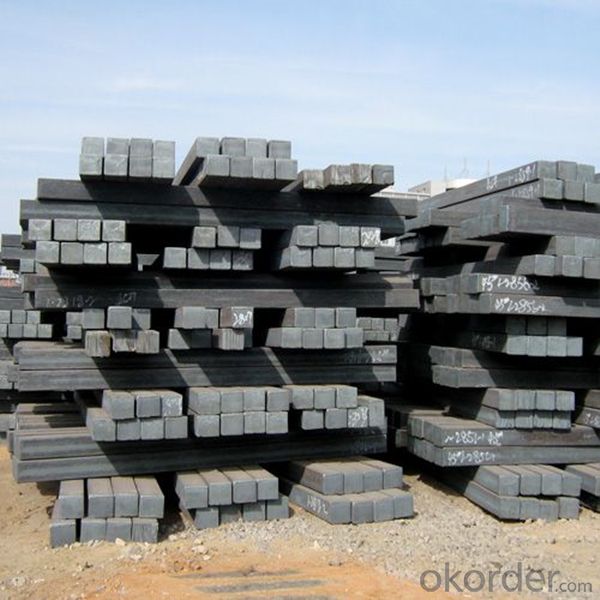
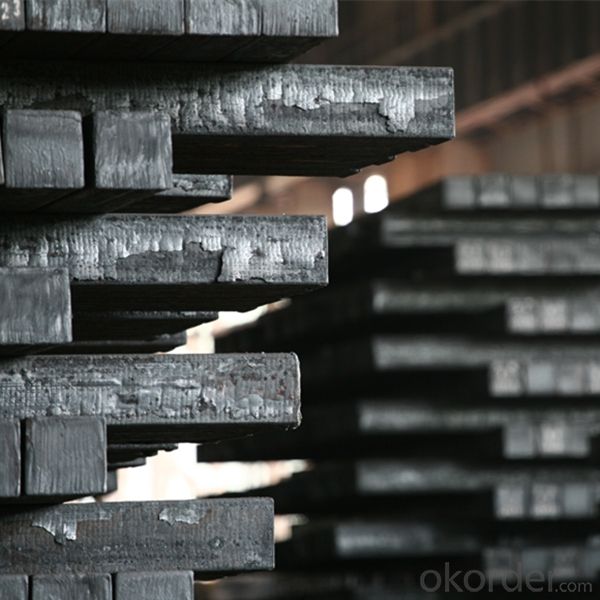
- Q: How is steel used in the production of mining equipment?
- Steel is commonly used in the production of mining equipment due to its strength, durability, and ability to withstand the harsh conditions of mining operations. It is used to manufacture various components such as drill bits, crushers, conveyors, and machinery frames, providing the necessary strength and reliability needed for efficient mining processes.
- Q: How is steel used in the manufacturing of water treatment systems?
- Steel is commonly used in the manufacturing of water treatment systems due to its durability and corrosion resistance. It is used to construct various components of these systems such as tanks, pipes, and frames. Steel ensures the structural integrity of the system and helps in withstanding the harsh conditions often found in water treatment processes.
- Q: How is steel used in the production of electrical appliances and wiring?
- Steel is commonly used in the production of electrical appliances and wiring as it provides a strong and durable framework for various components. It is often used in the construction of appliance casings, motor housings, and brackets, ensuring the safety and protection of internal electrical components. Additionally, steel is used in electrical wiring as a support structure, providing strength and stability to carry and distribute electricity effectively.
- Q: Can steel be recycled? If so, how?
- Yes, steel can be recycled. It is one of the most commonly recycled materials in the world. The recycling process involves collecting steel products, such as cans, cars, or appliances, and then shredding them into small pieces. These pieces are melted to remove impurities, and the molten steel is then shaped into new products. Recycling steel not only conserves natural resources but also reduces energy consumption and greenhouse gas emissions.
- Q: What are the common uses of steel in the defense industry?
- Steel is commonly used in the defense industry for various purposes, including the production of military vehicles, aircraft carriers, submarines, and tanks. It is also utilized in the construction of bulletproof vests, helmets, and other protective gear. Additionally, steel is used in the manufacturing of weapons, such as firearms, artillery, and missiles, due to its strength and durability.
- Q: What are the maintenance and care requirements for different steel products?
- The maintenance and care requirements for different steel products vary depending on their specific use and environment. However, some general maintenance practices for steel products include regular cleaning to remove dirt and debris, avoiding exposure to corrosive substances, applying protective coatings or paint to prevent rusting, and conducting routine inspections for any signs of damage or wear. Additionally, lubrication and proper storage can also contribute to prolonging the lifespan of steel products. It is always recommended to refer to the manufacturer's guidelines or consult with industry professionals for specific maintenance instructions tailored to each steel product.
- Q: What are the different types of steel coatings for corrosion prevention?
- Some common types of steel coatings for corrosion prevention include zinc coatings (such as galvanization), epoxy coatings, polyurethane coatings, and ceramic coatings.
- Q: What are the common uses of steel in the mining industry?
- Steel is commonly used in the mining industry for various applications such as structural support in mine shafts, equipment fabrication, and manufacturing of machinery and tools used in mining operations. It is also widely used in the construction of mining infrastructure like pipelines, storage tanks, and transportation vehicles due to its strength, durability, and resistance to corrosion.
- Q: What are the different types of steel sheets and their uses?
- There are several types of steel sheets available, each with its own unique properties and uses. Some common types include hot rolled steel sheets, cold rolled steel sheets, galvanized steel sheets, and stainless steel sheets. Hot rolled steel sheets are made by rolling heated steel through large rollers, resulting in a rough surface finish. They are commonly used in applications where strength and durability are important, such as construction, automotive manufacturing, and shipbuilding. Cold rolled steel sheets are produced by further processing hot rolled steel, which results in a smoother and more refined surface finish. They are used in applications that require precise dimensions and a higher level of surface quality, such as appliances, furniture, and automotive parts. Galvanized steel sheets are coated with a layer of zinc to protect against corrosion. They are commonly used in outdoor applications, such as roofing, fencing, and electrical enclosures. Stainless steel sheets are highly resistant to corrosion and staining, making them suitable for a wide range of applications. They are commonly used in industries like food processing, chemical processing, and medical equipment manufacturing. Overall, the choice of steel sheet depends on the specific requirements of the application, including factors like strength, corrosion resistance, surface finish, and cost.
- Q: How is steel pipe welded for structural applications?
- Steel pipe is commonly welded for structural applications using various welding techniques such as electric resistance welding (ERW), submerged arc welding (SAW), or gas metal arc welding (GMAW). These methods involve applying heat and pressure to join two or more sections of steel pipe together, ensuring a strong and durable bond.
Send your message to us
Prime Steel Billets From China Tangshan Manufacutrer
- Loading Port:
- China main port
- Payment Terms:
- TT OR LC
- Min Order Qty:
- 1000 m.t.
- Supply Capability:
- 100000 m.t./month
OKorder Service Pledge
OKorder Financial Service
Similar products
Hot products
Hot Searches
Related keywords
